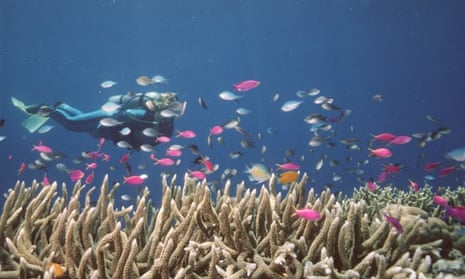Most of the world’s protected marine areas are failing to properly protect aquatic life, with many showing few differences from neighbouring areas that are openly fished, an Australian-led study has found.
University of Tasmania research of 87 marine protected areas in 40 countries showed the best marine parks had on average eight times more large fish and 14 times more sharks than fished areas.
But the research, published in Nature, found that 59% of the marine parks studied were “not ecologically distinguishable from fished sites”.
Researchers identified five key traits of a well-managed marine park – no fish take, well enforced, established for longer than 10 years, larger than 100 square km and isolated by deep water or sand.
Only marine parks with four or all five of these criteria were effectively boosting conservation values, the study found. Among the 26 marine areas studied in Australia, the only place with all five key traits was Middle Reef, near Lord Howe Island.
The six-year study, which utilised scientists and divers from 19 countries, concluded that while the number of marine protected areas was increasing rapidly, the benefits generated were “difficult to predict and under debate”.
“MPAs often fail to reach their full potential as a consequence of factors such as illegal harvesting, regulations that legally allow detrimental harvesting, or emigration of animals outside boundaries because of continuous habitat or inadequate size of reserve,” the paper states.
“Our results show that global conservation targets based on area alone will not optimise protection of marine biodiversity. More emphasis is needed on better MPA design, durable management and compliance to ensure that MPAs achieve their desired conservation value.”
Prof Graham Edgar, lead author of the report at the University of Tasmania’s Institute of Marine and Antarctic Studies, said that poor quality marine parks needed to be “retrofitted” to ensure they properly protected underwater life.
“Given the huge changes now occurring out of sight under water, and our poor knowledge of exactly what is happening and how best to deal with the various threats individually, the need for protected areas that safeguard whole communities of marine species has never been greater,” he said.
“What we do know is that numbers of many Australian marine species have collapsed since European settlement, including some that have disappeared.
“At present, coastal zoning maps are confusing, with the few conservation gems hidden amongst protected areas that are ineffective because of inadequate regulations or poor enforcement.”
In December, the Coalition government tore up management plans drawn up by Labor to create the world’s largest network marine parks off Australia’s coast.
Greg Hunt, the environment minister, said the plans would have “locked out” recreational fishers from Australian waters. While the marine park boundaries would remain, new management plans would be created, dismaying environmental campaigners who pointed out that most non-fishing areas were more than 50km from population centres.
The Great Barrier Reef marine park, possibly the most famous marine park in the world, is set to become the dumping site for 3m cubic metres of dredged seabed after a permit for the controversial disposal was issued last week.







Comments (…)
Sign in or create your Guardian account to join the discussion